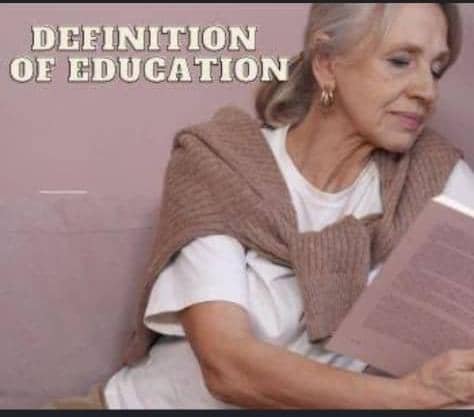WHAT IS EDUCATION?
Education is the process of acquiring knowledge, skills, values and habits through study, experience, training, or teaching.
It's not just about going to school and memorizing facts.

Education in Nigeria is a mix of opportunities and challenges, shaped by the country’s diverse culture, economy, and government policies. It follows a 6-3-3-4 structure: six years of primary school, three years of junior secondary, three years of senior secondary, and four or more years of tertiary education. The system includes public and private institutions at all levels, with instruction mainly in English.
At its best, Nigerian education produces highly skilled graduates, with universities and polytechnics offering a wide range of programs. Private schools often provide better facilities, smaller classes, and more modern teaching methods, while public schools, though more affordable, sometimes struggle with overcrowding, limited resources, and inconsistent teacher training.
Access to education has improved over the years, but issues remain, such as strikes in public universities, insufficient infrastructure in rural areas, and economic barriers for low income families. Despite these, many Nigerians value education as a key to personal growth, social mobility, and national development.
In Nigeria, the law and official policy do not limit education based on gender in principle, both males and females have the right to study as far as they are capable and willing, from primary school to Ph.D.
However, in practice, the reality can be different in some areas:
Urban and educated communities: Boys and girls generally have equal opportunities, and many women reach the highest levels of education, becoming professors, doctors, engineers, and political leaders.
Rural and traditional communities: Cultural norms, early marriage, and economic hardship sometimes limit girls’ education. In some northern regions, female school enrollment rates are lower due to religious, cultural, or security challenges.
Economic factors: Poverty can force families to prioritize educating boys over girls, especially when resources are scarce.
Security issues: In some areas, especially those affected by conflict or insurgency, safety concerns can disproportionately affect girls’ schooling.
So, while gender equality in education is guaranteed on paper, societal attitudes, poverty, and local customs can still create barriers for girls more than boys though this gap has been narrowing over the years through awareness campaigns, scholarships, and government programs.

Primary School Enrollment
Male primary enrollment (gross): around 87.1% as of 2021 .
Female primary enrollment data not broken out clearly in that same dataset, but regional breakdowns show significant gaps: UNICEF reports that in Northern Nigeria, net primary attendance is only about 53%, and for girls, it can dip as low as 47.3% in some states .
Secondary School Enrollment
Female secondary enrollment (gross): approximately 47% in 2021 .
Overall secondary enrollment (not gender-specific): about 47.2% in 2021 .
Key Insights
Level Male Enrollment Female Enrollment
Primary (gross) 87% Regionally low ( 47–53% in the North)
Secondary (gross) Not specified 47% nationally
There’s a clear gender gap in school attendance, particularly in primary education within rural and Northern regions.
Secondary school shows near equal gross enrollment, but that reflects higher male rates in many parts and improvement for girls in some states.
Summary
While primary enrollment for boys is relatively high (87%), many girls especially in Northern regions still face barriers to attendance, with net rates dropping as low as 47%. At the secondary level, female enrollment has risen to around 47%, matching the national average, though disparities remain across regions.

